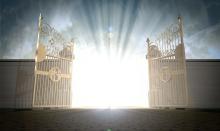H'rumphs

SUPREME COURT Justice Samuel Alito recently gave a speech predicting challenging days ahead for people of the Christian faith, although he didn’t seem too concerned about people of other faiths, you know, the godless ones. “It is up to all of us to evangelize our fellow Americans about the issue of religious freedom,” he told a gathering of the Advocati Christi, a group of Catholic lawyers and judges which—and they will deny this—you just know is the secret society that chased Tom Hanks all over Rome in The Da Vinci Code. (They never caught him because he couldn’t be late to the set of his next movie. Secret Vatican sects may be powerful and nefarious, but they’re no match for Hollywood’s more unforgiving God of Staying on Schedule.)
Alito was referring to the current “onslaught” against the freedom of American Christians to practice bigotry and discrimination (italics mine; actually, so are the words), such as refusing to do business with gay people or provide comprehensive health care to women. As you may recall, giving employees access to contraception offended the Christian owners of Hobby Lobby, one of the nation’s largest purveyors of arts and craft items—mainly high-end pipe cleaners and crepe paper that the Dollar Store doesn’t carry. (I’ve never shopped at Hobby Lobby, although I’m a frequent patron of the Dollar Store, mainly for food items past their freshness date. But with Twinkies it doesn’t matter.)

BEFORE WE BEGIN, I want to state unequivocally that I have never attempted to open back-channel communications with the Kremlin. I wouldn’t even know where to look for a back channel, although I’m guessing it’s down by the river. I state this partly as an admission that, in this city of nonstop intrigue, this cauldron of shocking and possibly treasonous revelations, this constant stream of leaks and denials, this torrent ...
... I’m sorry, where was I going with this? Oh, now I remember: I live in a city where each day brings another bombshell of treachery and betrayal, but I’m always the last to know. As a journalist, this hurts.

AS A CHRISTIAN social justice magazine, Sojourners maintains very high standards. We take seriously our prophetic role of holding political leaders accountable, but we also adhere to important social norms when calling out an individual. We would never consider commenting on a person’s physical appearance, such as the fact that Jeff Sessions is too short for his ears. No, we take the high road. It’s what’s inside that counts, and we would never stoop so low as to denigrate someone’s dress or demeanor. That would be wrong. Wrong, wrong, wrong.
However.
Is it just me, or have you noticed that Ivanka Trump and her husband seem to be possessed by aliens?

WITH ONLY a month left before the start of the annual war on Christmas—my Bill O’Reilly desk calendar keeps me up to date on all the seasonal liberal conspiracies—there is still time to plan this year’s shopping, starting with a new president.
Despite the fact that most voters are in critical need of a discerning hand to guide their choice—a choice that requires more thought than is possible during the commercial breaks on “Dancing With the Stars”—Sojourners is forbidden from providing that guidance because of restrictions from the Internal Revenue Service.
But this election is too important for us to quietly surrender to 501(c)(3) rules, since acquiescence is the final sanctuary of the coward, if he knew how to spell it. This year, with our nation so divided, it is time for Sojourners to issue a clear endorsement of one candidate, regardless of the consequences (a word that uses the letter “c” with laudable efficiency).
WE HAVE committed acts of civil disobedience before—getting arrested for protests against South African apartheid, the secret wars in Central America, and the immoral budget priorities of Congress, and, in a lesser known act of conscience, loudly objecting to the watered-down beverages on tap at our neighborhood bar. (Always the clever one in the group, I called it “tap water.”) The pizza was also horrible, but we let that one slide. The arc of the moral universe is long, but it bends toward justice. Unfortunately, justice is probably going to get bent long before they add more pepperoni. You just can’t rush bad pizza.
But where was I? Oh yes, our brazen act of defiance against restrictions of our 501(c)(3) status. It should be noted that 501(c)(4) nonprofits are allowed more leeway, as long as their work is educational and contributes to the “social welfare” of the country. The fact that many 501(c)(4)s are mainly promoting the social welfare of industrial polluters, gun manufacturers, and other groups of interest to Karl Rove is beside the point.

THE BRILLIANT white lights could mean only one thing. Okay, two things. Either I was in heaven, in the place where people wait nervously for their performance review with God, or I was in the recovery room after one of those Elderly Man Procedures and the nurses were keeping their humorous thoughts to themselves, something that would have been impossible for me had our positions been reversed. (“Hang on, I’ve got another one. What’s the difference between a colonoscopy and a ... shh ... he’s waking up! Darn it!”)
The tanks of oxygen around the room were another indication that this wasn’t heaven, although at that altitude they might come in handy. (Do you breathe when you get to heaven? I know you have to stop breathing to even be considered.)
I hesitate to recount another medical procedure to readers who have grown weary of the chronicles of my continuing decay. But I bring this up mainly for eschatological reasons. (Coincidentally, one gets a colonoscopy for scatological reasons. But I digress.)
At my age, if you’re undergoing any procedure that involves general anesthesia, you must be prepared for the possibility of not waking up. You need to have your affairs in order—such as writing down your passwords for surviving loved ones, skipping ahead to the last episode of the TV show you’ve been streaming at the office, and gassing up the car one last time (surviving loved ones should really learn to do that for themselves)—and make your peace with God.
And what better time to meet the Lord than when both society and technology are telling me I should step aside. This year’s election left me emotionally exhausted, I failed again to receive the MacArthur genius grant (how many more letters does my mom have to write?!), and I’m aging out of some features on my cellphone. I only use Facetime by mistake, inadvertently triggering the hideous apparition of some sickly relative of advanced years. And I’m afraid to open Yelp! because it sounds like it could hurt me.

WELL, WE'RE glad that Thanksgiving is over. So much tension, just under the surface, which occasionally roared above the special lace tablecloth. “You’re carving a beautiful turkey, Aunt Edna. It’s too bad you cut the heart out of democracy when you voted for that buffoon. Could I have some more sweet potatoes, please?”
Or: “That’s the best pecan pie I’ve ever eaten, Sis. It helps take out the bitter taste of your voting to plunge this nation into a dark abyss of fear. Ooh, is that whipped cream!?”
It was probably okay in some households. Muslim Americans had no problems passing the green beans without mumbled criticisms of a relative’s recent vote. Jewish families, confident in their relative political unanimity, doubtless had a tension-free celebration. And most families of color could enjoy each other with minimal strain. (“Cousin Bob, bringing something from Chipotle is not appropriate for the Thanksgiving potluck. But you’re family, so it’s okay. Now let’s give thanks to God, who was totally not paying attention on Nov. 8.”)
WHITE EVANGELICALS had the toughest time, especially in families with mixed marriages (“You married a Catholic, but I still love you, and maybe even her, at some point in the future.”), and the inevitable presence of relatives with divergent political views
Saying grace was the hardest part of the meal, when liberal family members peeked accusingly at their cousins, whose eyes were closed in pious gratitude that their guns were safe and that energy companies can finally mine the coal under our national parks. They were also giving thanks for more excessive military spending, cutting taxes for the rich, and turning over women’s reproductive rights to the authority of aged white men on Capitol Hill, as is their constitutional right. At least, this is what the progressives assumed their kinfolk were praying for. You can’t really tell, of course, because most people’s eyes were closed, a classic mistake at family gatherings when you’ve got to mentally calculate if there’ll be enough white meat for seconds. Or if you should save room for dessert. (Kidding. This is America. We’ll have it all.)

WHAT A MESS. What is it about you modern burglars that insists on such lack of tidiness, such disrespect for the common courtesy of wiping one’s feet? Not to mention a callous disregard for a law of physics, the one that states that every action has a reaction. Drawers, to name one example, close as well as open. No need to drag them out onto the floor, scattering the contents under foot, when you simply could have pulled them out part way—reviewed the contents, made your selections—and then closed. I understand the need for haste. Burglars, as a rule, are on a tight schedule. But the window of opportunity was, in our case, between 9 a.m. and 5 p.m., give or take.
As you probably know, the iconic symbol of your occupation is an unshaven man with a sock cap and a crowbar, a jittery skulker no mother would be proud of. He enters a home in the dead of night while the residents sleep, their faces relaxed and undisturbed by the beam of a flashlight briefly flickering over them, then illuminating the dresser where most people keep their valuables. In our case, as you discovered, there were none, only old Trader Joe’s receipts and a couple tear-stained movie ticket stubs that I can’t yet toss. (Note to Disney: You can stop now. You’ll never make anything as good as Moana and ... darn it ... I promised myself I wasn’t going to cry again!)
GIVEN YOUR occupation’s nocturnal custom, we were surprised to return home and discover you had robbed us in broad daylight. Apparently, your new business model is to wait until your victims leave for work and then, at a convenient time, start your own work day. One envies this, of course, since you can sleep in most mornings, setting the alarm for 9-ish, and listen to NPR as you linger over a second cup of coffee. Then you can take some “me time” before heading off to work.

OKAY. SORRY. It only feels like it’s been a year, an exhausting 12 months of angry tweets, corrosive diplomacy, and cowering federal workers. And that was just in December! You remember, don’t you? That time before the inauguration when we were supposed to have only one president at a time, and it wasn’t Obama?
That was when Donald Trump announced his cabinet nominees, mostly billionaire business people suspected of being woefully unqualified for government service. Then they spoke at their congressional hearings and removed all doubt.
Sadly, we still have nine months to go before we can steel ourselves for Donald Trump’s second and final year as president, when many political experts predict that financial entanglements will make his impeachment inevitable. It will be an ugly televised spectacle, probably dragging on into sweeps week, but let’s be honest: Trump would want it that way. And he’ll take pride that his impeachment hearings will get bigger audiences than even his inauguration, where millions of his imaginary friends showed up, although they were too shy to be photographed.
And then he’ll be fired. A welcome possibility until you remember who’s next in line, an Old Testament Christian whose perfect hair and smooth monotone evoke a preening televangelist right before his inevitable downfall. And if he falls, we get Paul Ryan, a man who would privatize his own mother. (Okay, that doesn’t make sense. Sorry. Sometimes the writing gets away from me.)

THANK GOODNESS it’s Easter, and Lent has concluded, and you’re back to eating chocolate or drinking wine, or finally stopped trying to meditate a half hour each night and just ended up noticing places that need dusting. But it’s still February for me, and I’m only on Day 10 of giving up Facebook.
So far, I’m 0 for 10. I can’t even do one in a row.
I didn’t commit to giving up Facebook altogether. One can go only so long without pictures of friends’ newborns or reposting that video of a hamster doing backward somersaults ... SO ADORABLE! But I had prayerfully pledged to stop making political comments online. And stop sharing elucidating articles from The New York Times, and stop forwarding snarky memes, and stop raging against demonstrable falsehoods posted by the angry and the prejudiced, specifically my relatives south of the Mason-Nixon Line. (How did these people get a computer!? Did they pass a background check first?)
Stopping Facebook cold turkey was the only remedy for a truth junkie like me. Because I was overdosing on outrage. The arc of the moral universe bends toward justice, but sometimes it needs to pull over, roll down the window, and shout, “Hey, Neanderthals, read a book!”
My addiction started out harmlessly enough with, you know, peer pressure. My friends were doing it—fighting the good fight for truth on the internet—and with my legendary skills as a writer person who can do, like, grammar stuff, I could be another righteous warrior in a world gone mad.
But it was making me mad, and I desperately needed to stop, for at least 40 days, as well as 40 nights. (I briefly smelled a Lenten loophole that would leave my evenings free to rant, but I couldn’t confirm it on Google.)

WHEN I RECEIVED an email from the president of Wells Fargo bank—expressing remorse for years of financial malfeasance—I looked forward to reading words crafted by highly paid public relations professionals. Given the depth of the bank’s abhorrent irregularities—such as altering depositors’ records and pressuring employees to open bogus accounts—Wells Fargo needed to set just the right tone when apologizing to a potential nationwide jury pool (and feeling the squeeze from several boycotts).
But I set the email aside. At that moment, I was preoccupied with helping my granddaughter negotiate the new challenges of first grade. Unfortunately, this critical time in a child’s life is not helped by the institutional bias of public schools against adult family members sitting in the classroom. (I even offered to bring my own chair.) From that vantage point I could have guided my granddaughter’s tentative first steps in establishing enduring social relationships. (“Don’t sit next to that girl. Powerpuff Girls lunch boxes are SO last century.”) But this was not allowed.
As a consolation, I was told, I’d be welcome at something called “Family Day,” a dubious-sounding event of unspecified significance scheduled for the distant future.

Jerry Falwell Jr.: Jesus Christ!
Jesus: I’m going to assume that’s not an expletive.
Falwell: No, that would be Jesus H. Christ, which I would never use.
Jesus: Good. He’s a cousin on my mother’s side, and I’m still ticked at my aunt for that.
Falwell: But you’re HERE! In my own house! It’s the Rapture, the Second Coming! And you’re taking me home to my reward! PRAISE THE LORD! Just let me throw a few things in a suitcase and we’ll ...
Jesus: Relax, and put down your shaving kit. This is not the Second Coming. It’s more like a check-in.
Falwell: It’s not the end times?
Jesus: No [looking at his watch], not even close.
Falwell: But it’s so gratifying you’ve chosen to reveal yourself to me! It confirms that my good works have been recognized and recorded in the Lamb’s Book of Life, where the names of all the righteous are ...
Jesus: Actually, we use Excel now, and if your name is in there, it’s with an asterisk, Mr. Falwell.

WHEN I WAS a young man, colds were minor annoyances, though less annoying than colleagues responding to every sneeze with an automatic “God bless you,” despite lacking the ecclesial authority to do so. (What, you’re pope now?) Colds were temporary things, easily overcome by the strong immune systems of youth, and I never stayed home from work.

I SPENT THE PAST several weeks worrying about hurricanes—and the maddening way some people keep denying any connection between these storms (aka extreme weather events) and climate change. (I have this mental picture of me throwing these people into a flooded Houston neighborhood and shouting, “Is that science enough for you!?”)
Anyway, as a result, I totally missed the release of The Nashville Statement. After some research, I realized that this important document has been insufficiently ridiculed by an award-winning humorist. But since Dave Chappelle won’t return my calls (or answer my emails, or reply to those notes I left on his bedside table when he was sleeping; he looks so peaceful ...), I’m going to give it a shot.
The statement reaffirms conservative evangelicals’ belief that marriage is between a man and a woman (and presumably their lawyer when, you know, it doesn’t work out half the time), despite the fact that no one was confused about their stance, or needed reminding that this particular limb of the body of Christ makes God blush with embarrassment whenever they come up in conversation. (I heard that God doesn’t even make eye contact on elevators anymore.)
Nor was anyone surprised that the statement came from the Bible Belt, a region known for churchgoers who think Jesus was simply off-message when he preached the Sermon on the Mount. In their view, Jesus should have stuck with the PowerPoint on personal salvation, not that whole thing about “those” people being blessed.
The statement originated in Nashville, but it could just as easily have come from Shreveport, La., or Tallahassee, Fla. I also would have accepted The Dallas-Fort Worth Statement, The Tuscaloosa Statement (Roll Tide!), or The From-My-Cold-Dead-Hands Statement.
The Brooklyn Statement, not so much.

THERE ARE FEW times in life when we experience absolute clarity.
Normally, with the unrelenting rush of time, we live more from a sense of accidental encounter than with a plan, our decisions prompted by necessity instead of resolve. When that pattern is interrupted by an unexpected revelation, we stop and take note.
Recently, I experienced such a moment, a searing flash of certainty that changed the direction of my life: Under no circumstances will I ever walk on a high wire.
This summer’s Folklife Festival in D.C. featured the Flying Wallendas, a family of circus performers with a 200-year-old legacy of defying death high above ground uncluttered by unsightly things, such as nets. They perform in massive arenas, including three-ring circuses (circi?), their legendary mental focus undisturbed by the elephants on their left or zany clown cars to their right.
The Folklife Festival, however, presented more of a challenge to their concentration since, at any given time, no fewer than eight different venues—each with its own blaring sound system—were competing for attention. While Wallenda family members walked across a high wire with no net, an amplified voice from a demonstration in the next tent spoke of culinary techniques for outdoor cooking. The contrast was disturbing.

AFTER NEARLY 50 years moving from place to place—usually under cover of darkness to stay ahead of colleges claiming we still owed library fines—the Sojourners staff is finally moving to a place of our own.
We’ve been leasing space up to now, paying increasingly higher rents as the nation’s capital has become a hip and happening city. (Which began soon after we arrived in 1975. Coincidence? Not bragging, but vintage clothing stores didn’t become popular in D.C. until we showed up wearing clothing that, unbeknown to us, fit that category.)
Over time, the poor neighborhood that God called us to was overtaken by Starbucks and Target, and our office expenses went up accordingly. To be fair, maybe God wanted chain stores to provide low-cost merchandise to our underserved inner city. But what kind of god would also bring in a Bed, Bath, & Beyond?! In all our years working for justice and tenant rights, we didn’t once yearn for luxury sheets or French-made kitchen utensils. (Although, when you need Brita filters, they keep them just inside the front door. With Target, you have to go upstairs. I’m just sayin’.) When organic food stores started moving in, it was enough to make us nostalgic for buying milk at the corner liquor store. (You had to check carefully the date on the carton, because milk tended to hang around the store longer than did, say, Colt 45, which seemed to be much more in demand.)
SO IN AUGUST we’re moving. We’re calling it Sojexit, like Brexit, but with fewer catastrophic global consequences. After four decades under the thumb of landlords, we will finally be under our own thumbs, all 86 of them, if you count the interns. Our seventh and final move will be to a building we purchased. “We” meaning Sojourners, a Mennonite bank, and hundreds of supportive friends who share our commitment to justice, reconciliation, and having to empty our own trash.

JULY IS the month of our long-awaited political conventions, the final stop in a torturous electoral journey that most assuredly made our Founding Fathers roll over in their graves, throw up in revulsion, then roll back over with a raging headache, severe back spasms, and an irritable bowel. It’s been a tough year.
The Democratic Party will be meeting in Philadelphia, “The City of Brotherly Love,” and Republicans will gather in Cleveland, “The City That’s Having Second Thoughts,” because there was once talk about delegates bringing in their own firearms. But local officials convinced them to bring in a covered dish instead. (Fortunately, this still comports with the NRA’s noble philosophy: “The only thing that stops a bad guy with a casserole is a good guy with a casserole.”)
Delegates from across the nation will be gathering to affirm the choice of their party’s primary voters, the common folk whose wisdom is not always appreciated on Capitol Hill, but whose wishes deserved to be carried out. It’s the very essence of democracy, which this year featured the aerobic benefits of pushing and shoving. Hey, nobody said it would be pretty. But sometimes you have to take the road less traveled—the one paved with good intentions and littered with the signs you ripped out of your neighbor’s yard. But eventually you get back to the main highway of truth so the limousines of hope can ... uhm ... nope. Lost the metaphor. Sorry.
IT’S EASY to imagine the pandemonium that will afflict the conventions this year, and not just at the nearest Starbucks when thousands of impatient delegates with raging headaches, severe back spasms, and irritable bowels line up before the morning speeches. (Tip: Leave room for cream and three shots of vitriol directed at the other party.)

THIS HAS BEEN a year of harsh rhetoric, vicious condemnations, and flagrant name-calling, and that was just between Apple and the FBI. It was much worse in politics, with candidates hurling invective at a pace not seen since, okay, last year. They’ve called each other every name in the book—a book that would be banned in most public libraries—and have made our political institutions the laughingstock of the world. And not in a good way.
Having frequently been a laughingstock myself, I know how much fun it can be, but this feels different. The very character of our nation seems to be turning into a bad-tempered sourpuss. And not in a good way. Having frequently been a bad-tempered ... (Editor’s note: Just get on with it!)
In this time of political rancor and unrestrained social hostility, Americans are yearning for words of kindness. They are craving that rare note of hope. Unfortunately, I cannot provide this. It pains me to do so, but I must join in the refrain of negativity.
I really don’t like our cat.
LIKE MANY CANDIDATES, this cat came without being requested, but unlike Marco Rubio, he never left. We heard his desperate mewing outside our home and took pity on this helpless newborn. We fed him from a bottle for a couple weeks, amused by his playful biting and scratching, unaware he was just practicing until his jaws strengthened and his claws grew more lethal. Now, he’s fully grown and no longer cute. (His head is angular, like John Kerry’s, but without the heavy-lidded weariness of diplomatic responsibility and enormous private wealth.)
He basically rules our small home, a place whose normal-looking outside hides a frightening secret within. It’s like that remote farmhouse where fun-loving young people seek refuge after their car breaks down. The house seems welcoming at first, but then a strange, rending sound is heard (the cat ripping the shower liner), or a crash in the near distance (the cat knocking over precious heirlooms, but not the ugly ones). Walking into a room, the young people sense they’re not alone, and then someone’s leg is suddenly grabbed from under the couch, or clawed at from behind a chair.

THAT STATUE of Jesus standing with outstretched arms over Rio de Janeiro has always made a powerful impression on me; namely, how tired I would get if I did that for very long. These days, I don’t even greet family members with outstretched arms without written permission from my orthopedist, much less stand on a hillside piously overlooking a large population. (Not that anyone would ask me to. I’m very busy.)
It’s an awesome Jesus, although it has no moving parts and doesn’t light up at Christmas. It’s shorter than our own Statue of Liberty, and less green, and you can’t walk up a stairway inside it to peer out the top of his head which, in my opinion, is the creepiest thing you can do inside an American shrine. Unless it’s watching a baby spit up at the top of the Washington Monument, which I did years ago, after walking up the 897 steps to prove the stamina and grit of youth. (Come to think of it, maybe it was me that spit up.)
Nonetheless, that Jesus statue stands over Rio, night and day, making the people below extremely uncomfortable because they’re being constantly monitored by the Risen Lord. One can only hope that Rio’s famous nude beaches are outside his peripheral vision. (No peeking, sir.)
Living in Rio is hard enough, what with speaking a language that’s not quite Spanish. Portuguese is to Spanish as apples are to oranges, if the oranges tasted like bananas. Unlike the rest of South America, Brazil got stuck with Almost Spanish because in the late 1400s colonial powers Spain and Portugal divided up the continent using the negotiating technique of the day: rock, paper, scissors. Portugal chose rock. It was a different time then, with a different mentality. Five centuries later, we now know you should always choose paper.

